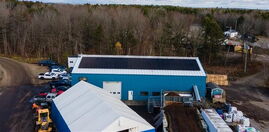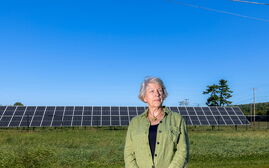
Op-Ed: US solar industry is under attack, raising Maine’s already high energy costs
It might sound counterintuitive, but a solar array in Portland, Maine, yields roughly the same amount of clean, renewable electricity per year as an array in Houston, Texas.

That’s because Maine’s latitude is the same as famously sunny Monaco on the French Riviera, and because solar panels are more efficient at Maine’s cooler temps compared to hot places like Texas.
Thanks to federal renewable energy tax credits in the Inflation Reduction Act, more solar was installed in Texas in 2024 than any other state, and more was installed in Maine last year than in any previous year. But those incentives are not long for this world.
The anti-renewable energy “Big, Beautiful Bill” passed on July 4 eliminates the residential solar tax credit at the end of 2025 and ends commercial solar tax credits in 2027. Both changes will significantly harm Maine’s solar industry, which had expected a more gradual phaseout of incentives under the Inflation Reduction Act.
These political gyrations, swinging radically from pro-renewable energy to anti-renewable, are why we call our industry a :solarcoaster," riding high when government policy is encouraging and swooping low when those policies are suddenly changed or eliminated.
Lurking in the background, with its enormous influence at every level of government, is the most powerful entity on earth in terms of political and financial wherewithal, the fossil fuel industry.
Like a cornered animal (imagine one with enormous teeth, claws and rippling with muscle), the fossil fuel industry is increasingly aware that most people would rather not burn finite, polluting oil, gas and coal, particularly if there are cost-effective alternatives.
Now that solar electricity is the cheapest form of energy in history and battery storage costs continue to plummet, the fossil fuel industry and its political allies are lashing out at clean tech in a desperate attempt to delay its inevitable long-term decline.
Impact on Maine
The new federal legislation will raise Maine’s already high energy costs, increase pollution and undermine our efforts to achieve true energy independence. Control over our energy future is crucial, considering that every year Maine businesses and consumers export $4 billion from the local economy to import finite, polluting fossil fuels from away.
Conversely, every time we invest in local renewable energy infrastructure paired with energy storage, we keep our energy dollars right here at home — building energy independence, creating good-paying jobs, protecting the environment and reducing our exposure to energy price volatility.
The good news is that Maine businesses still have time to take advantage of the 30% federal tax credit and accelerated depreciation benefits before the incentives disappear.
Now is an excellent time to invest in solar, battery storage and electric vehicle charging stations because your business can substantially lower its energy costs over the next 25-plus years by locking in a fixed rate for solar electricity that is far below volatile natural gas-fired electricity.
At ReVision Energy, a 100% employee-owned company and certified B Corp, we have been wrestling with political attacks on our industry since the company was launched in 2003.
Since November, we have laid off 85 employee-owners because of the new administration’s relentless disinformation campaign (in lockstep with the fossil fuel industry) to smear solar and wind energy, electric vehicles and battery storage.
Cautiously optimistic
The good news is that efficiency and affordability will always win in the marketplace, no matter how much the government puts its thumb on the scale in favor of the fossil fuel industry.
That’s why we remain cautiously optimistic about building an energy future that is cleaner, cheaper and better than eight billion people burning coal, oil and gas in earth’s closed atmosphere — which is roughly as sustainable as hanging around in a garage with the doors closed and the engine running.














0 Comments